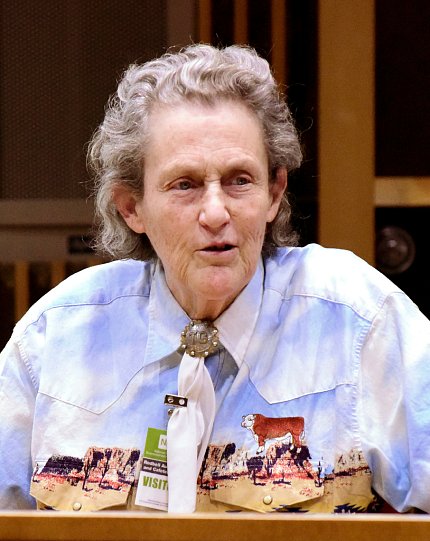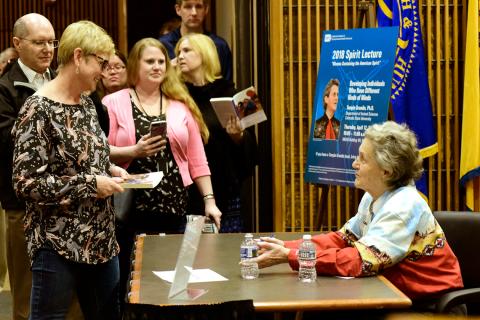Grandin Inspires in NIEHS Spirit Lecture

Photo: Steve McCaw
Dr. Temple Grandin brought her message about “Developing Individuals Who Have Different Kinds of Minds” to NIEHS recently. The professor of animal sciences at Colorado State University delivered an enlightening 2018 NIEHS Spirit Lecture to a packed auditorium. Grandin has published numerous scientific articles and books on animal behavior and her designs for humane handling of livestock are widely used today. She is also a well-known author and speaker about autism, which she discusses with the authority of a person with autism.
Grandin said she sees the world differently than typical adults. “Everything I think about is a picture,” she said. For visual thinkers like her, Grandin emphasized the importance of schools offering classes that foster creativity and teach skilled trades such as art, sewing, woodworking and auto shop. Creative geniuses such as Thomas Edison, Jane Goodall and Albert Einstein would likely have been labeled as autistic today, she suggested. Many of them had unconventional educations and she questioned whether they would have been as successful in today’s educational system.
“Too many kids are getting labeled, and I’m worried they are getting screened out,” Grandin cautioned. For those who think differently, she believes that early exposure to work experiences is important to success in life. “I was a lousy student in high school, and I wasn’t fond of studying until studying became the path to my goal of becoming a scientist,” she said.

Photo: Steve McCaw
In her research, visual thinking allows Grandin to better understand animal behavior. For example, she noticed details—such as dangling chains or shadows—that could spook animals. “Animal minds are specific because they are sensory-based and not word-based,” she said, explaining how these observations became part of her designs for livestock handling equipment and an animal welfare scoring system. “Observation is a very important part of science,” she reminded the audience. Visual thinkers see details others may overlook. Individuals with autism may be either visual, pattern, verbal or auditory thinkers or a combination. Scientific advances require different minds working together, she stressed.
Grandin’s message held personal meaning for many members of the audience, which included teachers, relatives and parents of individuals with autism, as well as some who identified themselves as having autism. To those seeking additional advice, Grandin returned often to the importance of exposing kids to activities of shared interest and to work experiences. “We’ve got to get these kids out doing something,” she said, suggesting walking neighbors’ dogs on a set schedule, volunteering at church and other tasks appropriate to age and ability levels.
A video of her NIEHS presentation is available at https://youtu.be/JUr9W4I6Y38.—Katie Glenn
